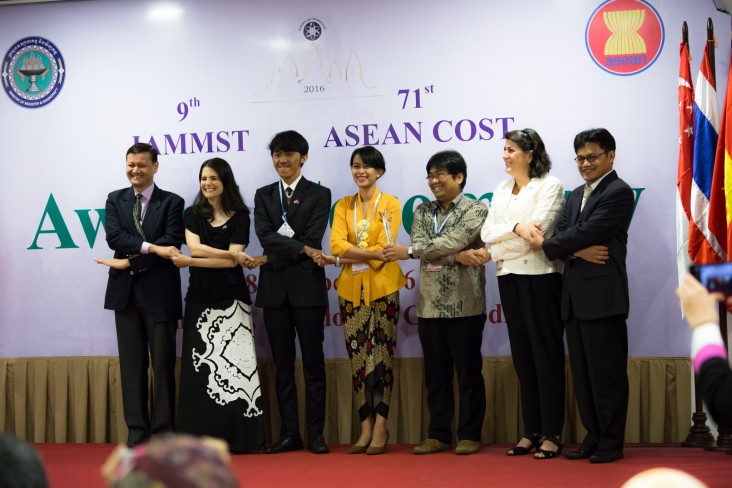
For Immediate Release
The United States and the Association of Southeast Asian Nations (ASEAN) awarded first place of the Young Southeast Asian Leaders Initiative (YSEALI) World of Food Innovation Challenge to a team of three Indonesian students from Gadjah Mada University. The team’s MINO Microbubble Generator technology increases oxygen in water and as a result, enlarges tilapia fish size by 40 percent, improving fish survival rate by nine percent, and ultimately increasing the fish farmers’ harvest.
“We believe this system will not only increase the welfare of fish farmers, but will also create job opportunities in other sectors, as well as improve food security locally, internationally, and regionally,” said Untari Febrian Ramadhani, who is part of the MINO Team.
Members of the ASEAN Committee on Science and Technology gathered in Siem Reap, Cambodia for a Ministerial Meeting and selected Muhammad Nabil Satria Faradis, Fajar Sidik Abdullah, and Untari Febrian Ramadhani as the winners. These students will take part in a study trip in March, 2017 to Austin, Texas, one of the main technology hubs in the United States.
“The United States is committed to partnering with ASEAN to provide young people with opportunities to contribute to science, technology, and innovation endeavors. We know that young people have the great potential to develop innovative technology solutions to some of the region’s most complex challenges around food security. That’s why the U.S. Agency for International Development (USAID) launched the YSEALI World of Food Innovation Challenge in February 2016 as part of the U.S. government’s initiative for engaging youth in Southeast Asia,” said Chargé d’Affaires Brian McFeeters.
The Innovation Challenge, implemented by the U.S Agency for International Development in partnership with technology giants Cisco and Intel, invited youth from across ASEAN Member Nations to propose technology-based solutions to address some of the region’s most daunting challenges in the fields of agriculture, aquaculture, and fisheries. More than 200 applications were received from Cambodia, Indonesia, Laos, Malaysia, Myanmar, Philippines, Thailand, and Vietnam.
The U.S. partners with ASEAN to cultivate emerging leaders, support economic integration, expand maritime cooperation, promote opportunity for women, and address transnational challenges. The breadth of programs is reflective of the deepened cooperation under the U.S.-ASEAN Strategic Partnership.
Download photos at https://drive.google.com/drive/folders/0BzS0ix7htnujZVFPV1lLQURXT28?usp=sharing. Follow the conversation on Twitter and Facebook at #FoodChallenge2016.







Comment
Make a general inquiry or suggest an improvement.